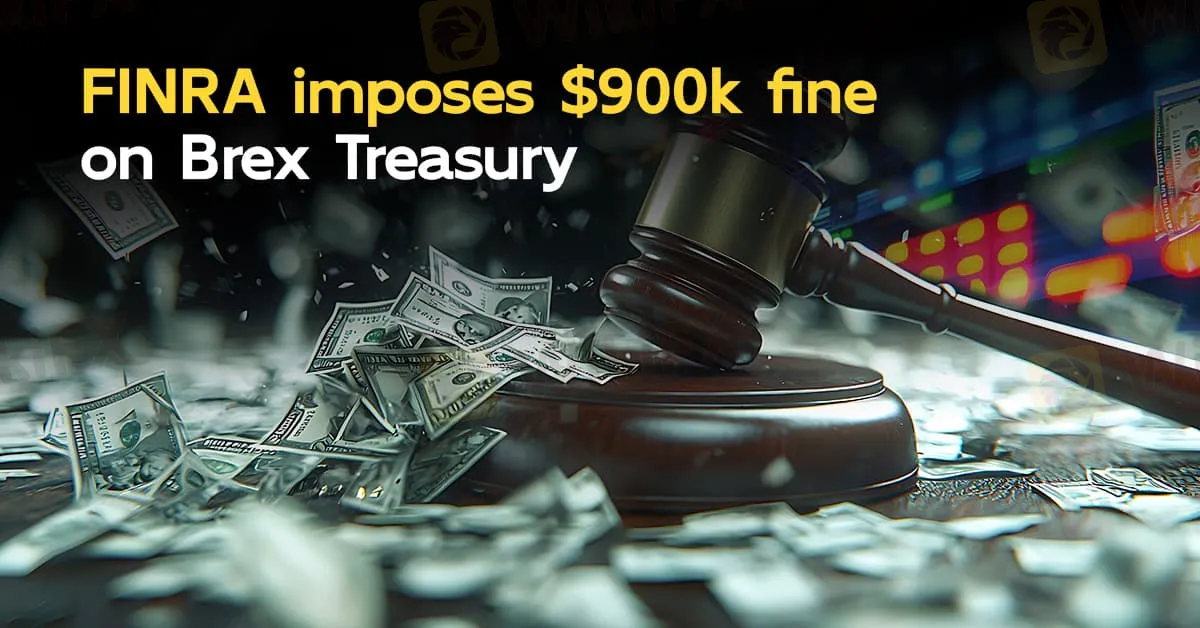简体中文
繁體中文
English
Pусский
日本語
ภาษาไทย
Tiếng Việt
Bahasa Indonesia
Español
हिन्दी
Filippiiniläinen
Français
Deutsch
Português
Türkçe
한국어
العربية
FINRA imposes $900k fine on Brex Treasury
Abstract:Brex Treasury LLC has reached a settlement with the Financial Industry Regulatory Authority (FINRA) to resolve allegations related to its anti-money laundering (AML) compliance practices. As part of the settlement, Brex Treasury has agreed to pay a fine of $900,000 and accept a censure.

Brex Treasury LLC has reached a settlement with the Financial Industry Regulatory Authority (FINRA) to resolve allegations related to its anti-money laundering (AML) compliance practices. As part of the settlement, Brex Treasury has agreed to pay a fine of $900,000 and accept a censure.
The settlement stems from Brex Treasurys use of an automated identity-verification algorithm that failed to meet AML requirements. The algorithm, which was intended to verify the identities of beneficial owners and customers, had several critical shortcomings.
Algorithm Design Flaws
Initially, Brex Treasurys identity-verification system relied on a limited set of customer information—names and phone numbers—to match identities with those in third-party databases. This approach proved inadequate, as it did not collect all the necessary identifying details, such as dates of birth, addresses, or identification numbers, required under the Bank Secrecy Act (BSA) regulations.
In January 2021, the firm began collecting more comprehensive data, including names, dates of birth, addresses, and identification numbers. Despite this, the system still fell short. The algorithm was designed to approve accounts based on matches in vendor databases, but it did not adequately address discrepancies in the date of birth or address, which could signal potential identity fraud.
Fraud Check Limitations
Brex Treasurys automated fraud checks, which included an external fraud score from a third-party vendor, were also insufficiently rigorous. The fraud score, intended to assess the risk of identity fraud, was not always accompanied by thorough manual reviews of discrepancies flagged during fraud checks. As a result, the firm approved accounts that had significant red flags.
Inadequate Manual Reviews
The firms manual customer screening process was equally flawed. From 2020 to 2021, Brex Treasury approved hundreds of potentially fraudulent accounts. These accounts attempted transactions exceeding $15 million using funds that failed to settle. Many deposits were recalled or rejected due to issues such as insufficient funds, leaving the firm unable to recover the funds or verify customer identities.
Regulatory Violations
The failures in Brex Treasury‘s AML practices led to violations of FINRA Rules 3310(b) and 2010. These rules mandate that firms maintain adequate policies and procedures for AML compliance. The firm’s inability to effectively vet customer identities and prevent fraudulent transactions highlighted significant gaps in its compliance framework.
Settlement Details
In addition to the $900,000 fine, Brex Treasury has agreed to a censure as part of the settlement with FINRA. The censure and financial penalty underscore the importance of robust AML practices and the need for firms to ensure that their identity verification systems are designed to meet regulatory standards.
This settlement serves as a reminder for financial institutions to continuously evaluate and improve their compliance mechanisms to prevent similar lapses and protect against financial crime.

Disclaimer:
The views in this article only represent the author's personal views, and do not constitute investment advice on this platform. This platform does not guarantee the accuracy, completeness and timeliness of the information in the article, and will not be liable for any loss caused by the use of or reliance on the information in the article.
Read more

What Every Trader Must Know in a Turbulent Market
The global financial markets are no strangers to periods of uncertainty, and recent weeks have been a testament to their unpredictable nature. Heightened volatility across major indices, including the US stock market, has left traders reassessing their strategies as they face both opportunities and risks.

NovaTech FX Scams Revealed - Hard to Withdraw Money
NovaTech, a trading platform that has recently gained considerable attention after its sudden collapse. The U.S. Securities and Exchange Commission (SEC) imposed penalties on the platform, its founders, and several major promoters. Here Let's explore this platform by examining its background and the underlying logic of its fraud scheme, and outline some key warning signs that investors should watch for when encountering similar platforms in the future.

WikiFX Review: Something You Need to Know About MIFX
WikiFX created a comprehensive review to help you better understand this broker named MIFX. We will analyze its reliability based on specific information, regulations, etc. Let’s get into it.

Philippine Banks Launch PHPX Stablecoin for Cross-Border Payments
Philippine banks collaborate to launch PHPX, a peso-backed stablecoin, revolutionizing cross-border payments with real-time transfers and financial inclusion goals.
WikiFX Broker
Latest News
Wolf Capital Exposed: The $9.4M Crypto Ponzi Scheme that Lured Thousands with False Promises
Confirmed! US December non-farm payroll exceeded expectations
Spain plans 100% tax for homes bought by non-EU residents
90 Days, Rs.1800 Cr. Saved! MHA Reveals
The Yuan’s Struggle: How China Plans to Protect Its Economy
LiteForex Celebrates Its 20th Anniversary with a $1,000,000 Challenge
Misleading Bond Sales Practices: BMO Capital Markets Fined Again by SEC
Italy’s Largest Bank Intesa Sanpaolo Enters Cryptocurrency Market
What Every Trader Must Know in a Turbulent Market
400 Foreign Nationals Arrested in Crypto Scam Raid in Manila
Currency Calculator






